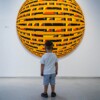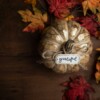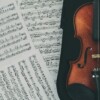
Christianity and Literature: Philosophical Foundations and Critical Practice
Co-authors David Lyle Jeffrey and Gregory Maillet set out in their book Christianity and Literature: Philosophical Foundations and Critical Practice with a relatively modest purpose, envisioning their task “as that of suggesting ways that a Christian worldview can provide a pertinent and fruitful approach to literary study as an academic discipline” (27). They wish to provide not a “universal template,” much less “an authoritative guide to the study of literature,” as if such a thing might be worthwhile or even possible, “but merely a rough map and some possible strategies for negotiating the terrain” (27).
With these limited goals in mind, Jeffrey and Maillet also delimit their potential audience by writing specifically for Christian students. While they aspire to attract readers at “both secular and Christian universities and colleges” (27), Christianity and Literature will no doubt be read primarily by students and teachers at Christian colleges and universities.1 For those who do read it, whether voluntarily or because it has been assigned, the book provides a wealth of information about how a religious worldview, far from being just another critical methodology to apply to literature, has for much of Western history been profoundly integrated into the whole field of belles lettres, such that any full understanding of literary texts before, say, the late nineteenth and early twentieth centuries virtually requires considerable knowledge of the Bible and of religion more generally. To reclaim aspects of that almost-forgotten legacy – through a sustained engagement with the Bible, for instance, or by resuscitating evaluative responses to literature that entail intellectual and even moral transformation – may well go some way toward restoring the true value of literary studies.
Jeffrey and Maillet acknowledge at the outset that “literary criticism has in the last two decades lost prestige as an intellectual discipline,” and, more troubling still, “general cultural confidence in literature itself as a source of meaning and value has likewise diminished” (37). Whatever we attribute these trends to, it seems clear that literature and literary studies no longer hold the privileged place in the landscape of higher education they once did, as evidenced by declining percentages (although presumably not declining numbers) of English majors since the 1960s and ’70s.2 Against these trends, the authors advocate the study of literature not just because it offers a repository of searching questions about the ultimate meaning and purpose of human existence, but also because it is a source of cultural wisdom about (if not answers to) those questions. Literature, after all, like philosophy and theology, comprises a “body of knowledge of which we may avail ourselves and in terms of which we may form a mature Christian intellectual identity” (310).
Literary study can be seen, from this perspective, as supplementing the spiritual disciplines in that it helps guide readers in a search for truth: “We firmly believe in the power of literature to enable our will to truth” (327). Neither a superfluous diversion from matters of faith, nor a threat to faith, literature offers a means of pursuing truth: “Thus, to quest for truth by means of fiction, as almost all serious literary readers come to appreciate, is to be engaged in the pursuit of discernment and wisdom” (43).
For Jeffrey and Maillet, in fact, a specific understanding of truth as transcendental and universal “proves to be foundational” to a proper understanding of beauty and goodness (45). As one of three “transcendentals” in the medieval Christian intellectual tradition – beauty and goodness are the other two – truth is the most crucial for “a coherent approach to the others” (45). How we understand truth has “profound implications,” according to the authors, “for the way we think about worldview questions, whether we consider them in the context of metaphysics (the nature of reality), epistemology (how we can be said to know) or ethics (what we take to be the good)” (46).
This way of articulating truth – the truth about the truth, if you will – makes it clear why the book’s subtitle is Philosophical Foundations and Critical Practice. For the authors invoke three major branches of philosophy – metaphysics, epistemology, and ethics – in relation to truth. Yet this heavy emphasis on truth as the grounds for and, indeed, the very reason to study literature runs counter to much current thinking about literary aesthetics.
To begin with, Jeffrey and Maillet appear to advocate an instrumental view of literature; we study literature not for its own sake but rather because it provides some salutary benefit: the acquisition of knowledge and wisdom, the pursuit of truth, and so on. Furthermore, this notion of truth as transcendent, while absolutely central to traditional Christian understandings of the term, pushes back against many postmodern formulations, as the authors themselves acknowledge when they observe that “in a politically charged, often polarized environment” like the contemporary academy, a more pragmatic and indeed protean approach to truth “has come to dominate literary theory” (53, 57). “Truth in such contexts is by definition always relative,” they write, “a subjective term employed to refer to an idea in the mind of an individual perceiver. Unsurprisingly, what counts as true then changes according to various interests or agendas to which it becomes conveniently a tool” (55). Jeffrey and Maillet emphatically reject consensus and pragmatic approaches to truth as “fundamentally incompatible with a Christian worldview” (57; their emphasis).
Rightly understood as anti-foundational, postmodern theory does present a formidable challenge to Christianity, which like other religions is foundational in its truth claims, both philosophically and theologically: “I am the way, the truth, and the life; no man cometh unto the Father, but by me” (John 14:6). If pragmatic theories of truth are anti-foundational, however, it does not follow that they are necessarily anti-realist, much less “that any antirealist view of what counts as truth ultimately prevents authentic appreciation of the beautiful and pursuit of the good, including inevitably what we call the common good” (63). According to Jeffrey and Maillet, “the possibility of our gaining an understanding of love and ultimately of being” presupposes a proper view of truth (63). Surely this assertion lacks the sort of intellectual humility that the authors elsewhere advocate for Christian literary critics in the academy, characterizing them at one point as the sort of people who are ideally given “more to self-examination than to judgment” (47). Does not such humility require recognizing our own epistemological limitations, including the very possibility that what we count as truth may turn out to be misguided or wrong?
Christian approaches to truth do tend to run counter to “consensus versions of prag-matic theory of truth,” which “undergird much postmodern literary and social theory,” but this does not mean students can afford to dismiss them altogether (62). While Jeffrey and Maillet are no doubt right to “recommend caution with respect to certain varieties of poststructuralist theory,” any serious student of literature must grapple with and in effect learn such theory, whether or not they agree with it (58). The authors later admit as much: “The questions raised by literary theory, though complex and often adversarial to Christian thought, need to be faced by all serious students of the discipline” (68). One could argue that even if we believe truth is transcendent, we are still left with the burden of debating or adjudicating what we think is true with those who may or may not agree with us. Besides, much of what we believe to be true cannot easily be verified; it has to be accepted on faith: “Now faith is the evidence of things hoped for, the evidence of things not seen” (Hebrews 11:1). Our access to truth is contingent and perspectival, even if truth itself is transcendent.
All this talk about truth is rather abstract. When Jeffrey and Maillet at last come down from the rarefied air of transcendental truth, the book is a treasure trove of detailed analyses: from a thorough enumeration of literary features of the Bible in a chapter titled “Our Literary Bible” that ends Part 1; to a wide-ranging survey of medieval and early modern literature, followed by a survey of seventeenth- and eighteenth-century literature produced during what the authors call the Age of Skepticism in Part 2; and finally, to some of the more agnostic novelists and poets of the nineteenth and twentieth centuries – Blake, Shelley, Wordsworth, Coleridge, Austen, Dickens, Eliot, Arnold, Hopkins, Hardy, Wilde, and so on – in Part 3. The sheer number of authors and works covered in these chapters is astonishing. If the book at times suffers from cursory (if not perfunctory) treatments of certain writers, the literary survey-like quality of the book’s chronological arrangement is more than com-pensated for by innumerable gems of concise analysis. And the book’s very capaciousness is sure to attract interest among scholars from a variety of fields. To take just one example from my own field, Jeffrey and Maillet address William Faulkner briefly (after Joyce and Woolf, but before Morrison), noting that Faulkner counterbalances his bleak treatment of a dysfunctional modern family in The Sound and the Fury (1929) with “the partially omniscient portrayal of the quietly noble Christian life of the Compson’s black servant, Dilsey” (275). Modeling for students a close reading of Dilsey’s Easter sermon at the end of the novel, Jeffrey and Maillet then conclude their discussion of Faulkner with this keen, understated insight: “As a southern writer, Faulkner is clearly interested in religion to a degree that exceeds his personal practice of it; in the American South, one might say, without such an interest and attunement it would be nearly impossible to write well about the culture” (275).
Something similar could be said about readers, of course: without an attunement to religion it would be nearly impossible to understand much of the Western literary canon, particularly works written before the twentieth century.3 This book at once admonishes and encourages us to hold ourselves (and each other) accountable for the “groundwork” in “foundational literatures,” first and foremost the Bible, necessary to comprehend so many great literary texts (312). The authors lament that “there is widespread ignorance of the Christian worldview out of which they were written” (312). Yet Christianity and Literature comes at an opportune moment, I think, when scholars are recognizing an urgent need to examine anew the relationship between religion and literature.4 In a concluding chapter, “Literary Studies in Christian Perspective,” Jeffrey and Maillet challenge Christian literary critics and students alike to take a leading role in restoring religion to its once prominent place in literary studies and thereby perhaps resuscitate the very “soul of the discipline” from its somewhat atrophied state (326). If, in so doing, we can take up the “broader cultural imperative” of restoring some of the diminished cultural authority and luster of literature, once considered the crown jewel of the liberal arts, then we will truly be doing “worthy and redemptive work” (312, 327).
Cite this article
Footnotes
- In a stridently anti-postmodern “Preface” to the book, included in each volume of the faith integration series at IVP Academic, series editors Francis J. Beckwith and J. P. Moreland begin with somewhat anxious comments about how busy students are these days and then proceed to write eighteen pages on how scholars have historically understood the phrase faith integration, much bandied about and agonized over in Christian colleges and universities.
- William M. Chase, “The Decline of the English Department,” The American Scholar (Autumn 2009): 32-42.
- I can still recall my professor in graduate school, a renowned Faulkner scholar, gently berating some 100-plus students in a large lecture class for their apparent ignorance of a pertinent Biblical reference in Faulkner.
- See Harold K. Bush, Jr.’s lively account of an academic conference titled “The Hospitable Text: New Approaches to Religion and Literature” held at the Notre Dame Conference Centre in London. “Native Tongues of London,” Books and Culture online, July 2011 http://www.booksandculture.com/articles/webexclusives/2011/july/nativetongues.html (accessed 18 August 2011).























